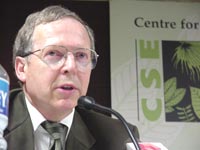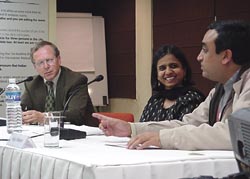California Air
Resources Board: A rare example of good governance
 |
Lessons
learned in California can easily be replicated today: Dr Alan C Lloyd, chairperson, CARB |
Dr Alan C Lloyd, chairperson,
California Air Resources Board (CARB), and a leading advocate of clean vehicle technology,
revealed at a public interface that the CARB has succeeded in slashing air pollution
levels by nearly half. California has the highest number of cars per person in the world
and it has recorded a huge increase in vehicle miles traveled - by as much as 90 per cent
- in the last two decades.
The interface was organised by the Centre
for Science and Environment (CSE) in the capital on Friday.
New Delhi, January 17, 2003:
"California has had many overwhelming successes in its pursuit of clean air. And it
is possible for other regions to draw upon its experience and hard-won wisdom, without
having to relearn some of the same painful lessons," Dr Alan C Lloyd, head of the
California Air Resources Board (CARB), which is reputed to have some of the most stringent
anti-smog regulations in the world, said at a CSE-organised interface in the capital on
Friday.
Addressing the public interface on 'Staying
Ahead for Clean Air: Learning from the Californian Experience', Dr Lloyd said: "The
path that California has followed has been one of innovation. Without precedents to guide
it, the state has had to chart its own course, often moving down blind alleys. But
eventually it has managed to pioneer many a path-breaking change. Lessons learned in
California can easily be replicated today."
Concern over public health has been the key
driving force behind CARB's regulatory agenda. Dr Lloyd pointed out that cautioning
against the adverse impact of air pollution on public health was what led to CARB drawing
support from the people and the policymakers. "In view of serious public health and
environmental problems, we had no alternative but to impose strong controls on emission
sources in a meaningful way."
CARB has consistently reviewed the effects
of air quality standards on health, based on the existing corpus of knowledge, to assess
whether the standards protect public health with an adequate margin of safety. The Board
was the first to adopt stringent standards for the tinier particulates PM2.5, and is the
only one to have standards for one of the deadliest fraction of particulates - sulphates.
These clean air standards have been pushed through despite strong opposition from the
industry.
 |
Dr
Alan C Lloyd, chairperson, CARB, Sunita Narain, Director, CSE, and Ajay Maken, Transport
Minister, Delhi, at the interface |
The anti-smog regulations aim to
reduce risk from toxic emissions, and this is what shaped up the diesel risk reduction
programme and zero emissions vehicles mandate. Concern over dirty diesel and its
particulate emissions - estimated to be responsible for 70 per cent of cancer risk in the
state - has prompted CARB to take swift regulatory action. Declaring diesel particulate
matter as a toxic air contaminant, it has set the most stringent fuel neutral standards
for 2007 that would cut diesel emissions by more than 90 per cent.
"We have to drive emissions to zero by
moving towards low carbon fuels (like natural gas) and ultimately to hydrogen," said
Dr Lloyd. Even as CARB insists on clean conventional vehicles, it urges the need to focus
on hybrid electric vehicles and fuel cell vehicles to reach the zero emissions target.
This has been one of the toughest battles for the agency as the industry has tried to
persistently scuttle its efforts. Though it has slowed down the pace of implementation,
the agency has remained undeterred.
Through fiscal incentives, CARB is aiming
at a zero emissions target as many areas of California continue to exceed air quality
standards for ozone and particulate matter that is extremely detrimental to public health.
An advocate of a 'total system approach' to environmental protection, Dr Lloyd believes
that public policy should be based on science and that governments should be proactive.
Delhi and other cities across the country
could take a few lessons from this. Dr Lloyd advocates the need for a leapfrog strategy to
skip the intermediary emission norms and go straight to EURO 4 or low emissions tier II
standards. California has moved beyond existing federal norms in the United States to set
stringent, precautionary and time-bound air quality standards in the interest of public
health.
Delhi transport minister Ajay Maken shared
information on his government's new integrated transportation plan and strategies for
in-use vehicles like improved inspection and maintenance programme. CSE organised this
interface at a time when there is much uncertainty and official hesitation to take hard
decisions and formulate a future roadmap despite the worsening pollution in India. |